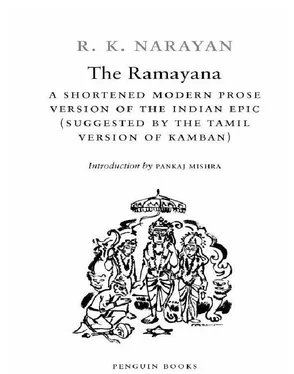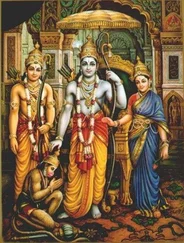Махариши Вальмики - The Ramayana
Здесь есть возможность читать онлайн «Махариши Вальмики - The Ramayana» весь текст электронной книги совершенно бесплатно (целиком полную версию без сокращений). В некоторых случаях можно слушать аудио, скачать через торрент в формате fb2 и присутствует краткое содержание. Жанр: Старинная литература, на английском языке. Описание произведения, (предисловие) а так же отзывы посетителей доступны на портале библиотеки ЛибКат.
- Название:The Ramayana
- Автор:
- Жанр:
- Год:неизвестен
- ISBN:нет данных
- Рейтинг книги:3 / 5. Голосов: 1
-
Избранное:Добавить в избранное
- Отзывы:
-
Ваша оценка:
- 60
- 1
- 2
- 3
- 4
- 5
The Ramayana: краткое содержание, описание и аннотация
Предлагаем к чтению аннотацию, описание, краткое содержание или предисловие (зависит от того, что написал сам автор книги «The Ramayana»). Если вы не нашли необходимую информацию о книге — напишите в комментариях, мы постараемся отыскать её.
The Ramayana — читать онлайн бесплатно полную книгу (весь текст) целиком
Ниже представлен текст книги, разбитый по страницам. Система сохранения места последней прочитанной страницы, позволяет с удобством читать онлайн бесплатно книгу «The Ramayana», без необходимости каждый раз заново искать на чём Вы остановились. Поставьте закладку, и сможете в любой момент перейти на страницу, на которой закончили чтение.
Интервал:
Закладка:
“Sidhasrama is far away . . . ?” began the King.
“I’ll ease his path for him, no need for a chariot to take us there,” said Viswamithra reading his mind.
“Rama has never been separated from his brother Lakshmana. May he also go with him?” pleaded the King, and he looked relieved when he heard Viswamithra say, “Yes, I will look after both, though their mission will be to look after me. Let them get ready to follow me; let them select their favourite weapons and prepare to leave.”
Dasaratha, with the look of one delivering hostages into the hand of an enemy, turned to his minister and said, “Fetch my sons.”
Following the footsteps of their master like his shadows, Rama and Lakshmana went past the limits of the city and reached the Sarayu River, which bounded the capital on the north. When night fell, they rested at a wooded grove and at dawn crossed the river. When the sun came over the mountain peak, they reached a pleasant grove over which hung, like a canopy, fragrant smoke from numerous sacrificial fires. Viswamithra explained to Rama, “This is where God Shiva meditated once upon a time and reduced to ashes the god of love when he attempted to spoil his meditation. 5From time immemorial saints praying to Shiva come here to perform their sacrifices, and the pall of smoke you notice is from their sacrificial fires.”
A group of hermits emerged from their seclusion, received Viswamithra, and invited him and his two disciples to stay with them for the night. Viswamithra resumed his journey at dawn and reached a desert region at midday. The mere expression “desert” hardly conveys the absolute aridity of this land. Under a relentless sun, all vegetation had dried and turned to dust, stone and rock crumbled into powdery sand, which lay in vast dunes, stretching away to the horizon. Here every inch was scorched and dry and hot beyond imagination. The ground was cracked and split, exposing enormous fissures everywhere. The distinction between dawn, noon, and evening did not exist here, as the sun seemed to stay overhead and burn the earth without moving. Bleached bones lay where animals had perished, including those of monstrous serpents with jaws open in deadly thirst; into these enormous jaws had rushed (says the poet) elephants desperately seeking shade, all dead and fossilized, the serpent and the elephant alike. Heat haze rose and singed the very heavens. While traversing this ground, Viswamithra noticed the bewilderment and distress on the faces of the young men, and transmitted to them mentally two mantras (called “Bala” and “Adi-Bala”). When they meditated on and recited these incantations, the arid atmosphere was transformed for the rest of their passage and they felt as if they were wading through a cool stream with a southern summer breeze blowing in their faces. Rama, ever curious to know the country he was passing through, asked, “Why is this land so terrible? Why does it seem accursed?”
“You will learn the answer if you listen to this story—of a woman fierce, ruthless, eating and digesting all living creatures, possessing the strength of a thousand mad elephants.”
THATAKA’S STORY
The woman I speak of was the daughter of Suketha, a yaksha, a demigod of great valour, might, and purity. She was beautiful and full of wild energy. When she grew up she was married to a chieftain named Sunda. Two sons were born to them—Mareecha and Subahu—who were endowed with enormous supernatural powers in addition to physical strength; and in their conceit and exuberance they laid waste their surroundings. Their father, delighted at their pranks and infected by their mood, joined in their activities. He pulled out ancient trees by their roots and flung them about, and he slaughtered all creatures that came his way. This depredation came to the notice of the great savant Agasthya (the diminutive saint who once, when certain demoniac beings hid themselves at the bottom of the sea and Indra appealed for his help to track them, had sipped off the waters of the ocean). Agasthya had his hermitage in this forest, and when he noticed the destruction around, he cursed the perpetrator of this deed and Sunda fell dead. When his wife learnt of his death, she and her sons stormed in, roaring revenge on the saint. He met their challenge by cursing them. “Since you are destroyers of life, may you become asuras and dwell in the nether worlds.” (Till now they had been demigods. Now they were degraded to demonhood.) The three at once underwent a transformation; their features and stature became forbidding, and their natures changed to match. The sons left to seek the company of superdemons. The mother was left alone and lives on here, breathing fire and wishing everything ill. Nothing flourishes here; only heat and sand remain. She is a scorcher. She carries a trident with spikes; a cobra entwined on her arm is her armlet. The name of this fearsome creature is Thataka. Just as the presence of a little loba (meanness) dries up and disfigures a whole human personality, so does the presence of this monster turn into desert a region which was once fertile. In her restlessness she constantly harasses the hermits at their prayers; she gobbles up anything that moves and sends it down her entrails.
Touching the bow slung on his shoulder, Rama asked, “Where is she to be found?”
Before Viswamithra could answer, she arrived, the ground rocking under her feet and a storm preceding her. She loomed over them with her eyes spitting fire, her fangs bared, her lips parted revealing a cavernous mouth; and her brows twitching in rage. She raised her trident and roared, “In this my kingdom, I have crushed out the minutest womb of life and you have been sent down so that I may not remain hungry.”
Rama hesitated; for all her evil, she was still a woman. How could he kill her? Reading his thoughts, Viswamithra said, “You shall not consider her a woman at all. Such a monster must receive no consideration. Her strength, ruthlessness, appearance, rule her out of that category. Formerly God Vishnu himself killed Kyathi, the wife of Brigu, who harboured the asuras fleeing his wrath, when she refused to yield them. Mandorai, a woman bent upon destroying all the worlds, was vanquished by Indra and he earned the gratitude of humanity. These are but two instances. A woman of demoniac tendencies loses all consideration to be treated as a woman. This Thataka is more dreadful than Yama, the god of death, who takes a life only when the time is ripe. But this monster, at the very scent of a living creature, craves to kill and eat. Do not picture her as a woman at all. You must rid this world of her. It is your duty.”
Rama said, “I will carry out your wish.”
Thataka threw her three-pronged spear at Rama. As it came flaming, Rama strung his bow and sent an arrow which broke it into fragments. Next she raised a hail of stones under which to crush her adversaries. Rama sent up his arrows, which shielded them from the attack. Finally Rama’s arrow pierced her throat and ended her career; thereby also inaugurating Rama’s life’s mission of destroying evil and demonry in this world. The gods assembled in the sky and expressed their joy and relief and enjoined Viswamithra, “Oh, adept and master of weapons, impart without any reserve all your knowledge and powers to this lad. He is a saviour.” Viswamithra obeyed this injunction and taught Rama all the esoteric techniques in weaponry. Thereafter the presiding deities of various weapons, asthras, appeared before Rama submissively and declared, “Now we are yours; command us night or day.”
When they reached a mist-covered wood on a mountain, Viswamithra told another story.
MAHABALI’S STORY
This is consecrated ground where Vishnu once sat in meditation. (Although Rama was Vishnu, his human incarnation made him unaware of his identity at the moment.) While Vishnu was thus engaged, Mahabali seized the earth and heaven and brought them under his subjection. He celebrated his victory by performing a great yagna, and used this occasion to invite and honour all learned men. All the gods who had suffered in their encounter with Mahabali arrived in a body at the spot where Vishnu was in meditation and begged him to help them regain their kingdoms. In response to their appeals, Vishnu took birth in a brahmin family as a person of tiny proportions; within this diminutive personality was packed a great deal of power and learning. Mahabali was quick to sense his greatness when this dwarfish man presented himself at the palace gate. Mahabali received the visitor warmly and respectfully.
Читать дальшеИнтервал:
Закладка:
Похожие книги на «The Ramayana»
Представляем Вашему вниманию похожие книги на «The Ramayana» списком для выбора. Мы отобрали схожую по названию и смыслу литературу в надежде предоставить читателям больше вариантов отыскать новые, интересные, ещё непрочитанные произведения.
Обсуждение, отзывы о книге «The Ramayana» и просто собственные мнения читателей. Оставьте ваши комментарии, напишите, что Вы думаете о произведении, его смысле или главных героях. Укажите что конкретно понравилось, а что нет, и почему Вы так считаете.












